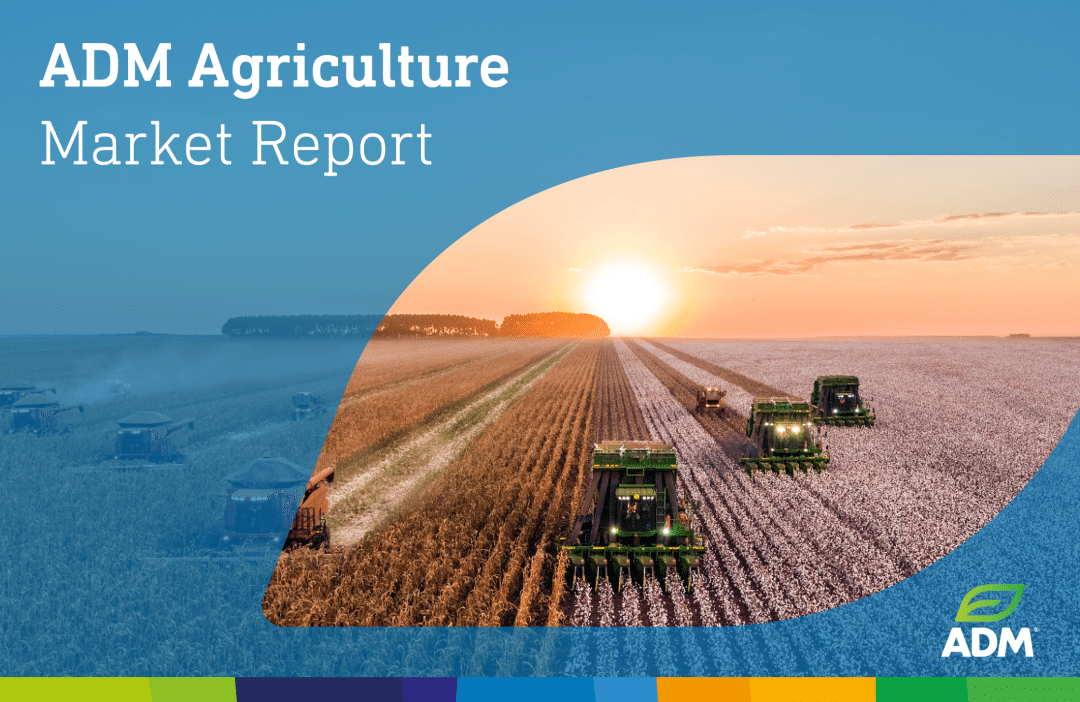WELCOME TO THE ADM AGRICULTURE WEEKLY MARKET REPORT
Wheat
- Chicago wheat is trading $10/t lower w/w, as bearish USDA data weighs on prices. Higher US corn production and Black Sea export potential are seen offsetting a larger-than-expected drop in 2024 US winter wheat sowings (estimated at 34.4mln acres, down 6.2% y/y), and continued talk of colder weather entering the Midwest, Northern and Central Plains, which is providing some concerns over potential winterkill. The fall in prices has enticed a few more international buyers into the market, although these will mainly be sourced from outside the US, where wheat exports are running 16.5% lower y/y, at just 10.38mln t.
- EU prices have followed the weaker global trend, falling €5/t w/w. Continued shipments from the Black Sea region will keep the pressure on EU prices, although the market got a boost with Egypt’s purchase of 60kmt of French wheat in a snap tender yesterday. However, they also purchased 300kmt of Russian wheat, so it appears that the French sale may be a ‘one-off’, and the fact that the French farm ministry lowered its projection of both intra-EU and third-country exports whilst raising ending stocks, does not bode well for the remainder of the season.
- The UK market is the UK market! Prices continue to edge lower, down £6-7 w/w, as weaker global markets and the continued strength of sterling keep farm prices on the defensive. The surprise rise in inflation released yesterday, now questions the likelihood of an interest rate cut, pushing more support into the pound, which in turn, will impact further prices. Market dynamics remain unchanged, but the release of official data showing November’s wheat exports at a miserly 5kmt, while imports were reported as being 169kmt, showing the dilemma facing the UK grain market. Year-to-date exports are now running 71% lower y/y, while imports are 38% y/y higher, and at a pace where we could witness a seasonal total of around 2mln t.
- All this will achieve is to swell the already projected higher yearly carry-over of stocks, although these will be needed against the backdrop of a substantial drop in the 2024 wheat harvest.
Malting Barley
- Malting barley premiums continue to hold their value at around £100/mt, although we are now seeing flat prices start to drift.
- The demand struggles of recent months persist, and over the last week, we have seen consumers washing out old crop contracts, both domestically and overseas, which does not look positive for nearby values as we progress into the second half of the season.
- We hear issues with old crop supply in Spain as germination there starts to falter, however malting quality in the UK appears to be holding up which adds to the relaxed mindset of the maltsters.
- New crop activity is similarly slow, and any demand shown by the maltsters is easily covered, with increased spring barley expectations keeping the market confident in supply. Some drier conditions in recent days have helped growers get on the land, and the spring barley planting campaign has begun alongside a flurry of later winter wheat plantings.
Feed Barley
- Demand for feed barley is once again on the back foot and values have dropped approx. £7/mt over the last week in sympathy with futures. Consumer coverage is comfortable for Q1, and as a result, compounders are happy to stay out of the market in the main.
- Old crop exports continue at a snail’s pace, and EU figures suggest only one coaster was shipped since last week, an indication that export demand will not provide much support to the market. We continue to see buying interest in Ireland around €5/mt below-offered levels.
- New crop markets are drifting, and despite barley trading at a historically competitive level vs wheat in the domestic market, demand is extremely limited, and we remain a long way over exportable level. We suspect that any pickup in origination will lead to further downside in this spread as the market scavenges for demand.
Rapeseed
- Soybeans are lower this week following a bearish USDA report on Friday. Brazilian production was cut as expected, although it was cut much less than the majority of estimates, to 157mln t vs 156.26mln t expected, and the majority of other estimates are now between 149mln t and 155mln t. Argentinian production was increased to 50mln t vs 48.87mln t expected and 48mln t last month. Both US and world-ending stocks were raised, despite expectations to decrease. NASS final production was also higher at 4.165 billion bushels due to an increase in yield from 49.9 bushels per acre to 50.6.
- NOPA crush figures came in at 195.32 vs estimates of 193.0. Bean oil stocks were also 190 million pounds above estimates. Extreme weather in the US however has slowed crushing this week, although looks to improve into next week, as temperatures return to more seasonal levels. Soybean export inspections are 25,576,844 mt which is 21.1% below last year. This is 53.6% of USDA’s 23/24 forecast vs the 5-year average of 53%.
- This week energy markets are slightly higher, although remain within the recent range. Low temperatures in the US have driven up energy usage, but have also started to strain supplies as this slows production – North Dakota oil production was reduced by 700,000 barrels per day. In the Red Sea, tensions remain high, which is adding to supply fears of potential losses.
- Veg oils are higher this week. India’s Dec palm oil imports jump to 4-month high of 894.186mt, up 2.8% from November. Argentina proposed raising the 2026 biofuel mandate to 15%. The current blend of 7.5% would initially increase to 10% before reaching 15% in 2026. India is said to have extended edible oil imports at a lower duty by another year, until March 2025. India’s lower import duty on crude palm oil, crude sunflower oil, and crude soy oil was set to expire this March but looks to continue to contain local prices.
- Canola is higher this week after reaching support at contract lows of $609. Canada is also seeing a cold front across the Prairies which is slowing farmer deliveries.
- MATIF rapeseed is higher this week after having established a new range between €418 and €432. We have seen the Feb/May spread trade into an inverse as funds begin rolling/taking off their Feb positions.
- Sterling trades at 1.16500.
Oats
- European oat markets have seen some trades over the last week, with some old crop feed oats trading at historically high levels out of Poland.
- Milling oats have also been trading, but largely for new crop SOND’24 positions.
- Old crop milling oats are seeing less offers, but this is in part down to a lack of farmer selling and perhaps a lack of supplies.
- Here in the UK, millers remain buyers of nearby positions, with prices supported by the overall lack of farmer selling.
- New crop prospects have improved thanks to the cold dry weather we have experienced over the last week, however with farmers prioritising wheat over oats and the high prices for Sustainable Farming Incentive (SFI) cropping, a large bounce in UK oat production remains uncertain.
- Bottom line, a general lack of selling is helping to support prices.
Pulses
Beans
- Grower engagement continues to improve, although tonnages are certainly slower than they have previously been. Farm gate pricing is remaining reasonably static, however, and is starting to show signs that it is cracking and moving to the downside. As previously discussed, this is primarily being driven by much more aggressive prices in the competing commodities that it traditionally fights against for a share of the ration. It could well be prudent for growers to take another look at selling what is left in the shed, even if it is for later in the year, and capitalising on these firm prices that are being paid whilst they are still available. Consumer interest is certainly waning at these firmer levels, so beans will need to come cheaper to maintain their place, otherwise they will risk being formulated out altogether.
- Geo-political unrest continues to loom in the background, helping keep Australian new crop prices slightly more supported than they otherwise would be. However, this will only endure for the duration of the Houthi threat, so we could see a return to business as usual with fairly little fanfare. Egypt is one of the largest consumers of beans and continues to be hurt by the nearby regional conflicts – anecdotally, the Suez contributes c. $750m to the Egyptian economy every month, so the significant drop in traffic is hurting the already struggling economy, which has real issues accessing US dollars. Egypt is certainly one to watch at the moment, as beans form a core part of the diet.
- Finally, the weather has turned (well, turning)! Noah no longer needs to assist most growers with their drilling, although the ground remains wet overall. Despite this, we have seen a good few days of sunshine now, along with a breeze to help things start to dry out, and even the odd drill has been sighted. Whilst it is early days, as machinery starts to be able to travel more easily, beans could be a welcome addition to the rotation. They still have comparatively good availability for spring seed and offer a good alternative for failed OSR, especially if Kerb has been applied. Wondering what to do with them though? Well, the ADM bean pool is still open for crop 24, and there are active buy back contracts on offer, so talk to your reps and they will be happy to help.
Peas
- After horrendous weather across the UK for several weeks, farmers will have some tough decisions to make regarding their winter crops. This does bring opportunities for spring crops as a replacement. Peas host one of the best gross margin opportunities vs other options available. Please contact your farm trader regarding our 2024 pea buyback offers, with seed availability on marrowfats, large blues, and yellow peas, all of which assist with nitrogen-fixing – a great option for your following wheat crop.
- Prices for human consumption remain at recent highs. Green peas continue to be in strong demand domestically and in Europe, with consumers who left it late to find cover now finding values much higher than originally expected. We continue to be keen buyers of any open market peas. Please contact your farm trader for a competitive bid!
Seed
- Spring cereal seed is sold out, however, we have several other opportunities for spring drilling including pea seed, available alongside our market-leading buybacks.
- We also have a vast portfolio of maize varieties ranging from 160 FAO to 240 FAO and suiting different end uses, including grain, forage, and biogas.
- Check out this YouTube video to find out more about our maize varieties, drilling, choosing a variety, and game maize.
- Game maize is perfect for cover and feed. Our all-seasons game maize blend includes varieties ranging in maturities to mean it stands, provides feed, and covers all season.
Fertiliser
- Egypt granular urea FOB prices have risen over $ 40 t over the last week, driven by a wave of short covering. As the European market starts to waken, higher levels at the farmgate in the UK are now possible.
- CF Fertilisers have released a new offer for March/April at prices that present a buying opportunity for many who have sat out. Imported suppliers are struggling to compete with replacement levels firm at a £ 20 t premium.
- NS values remain steady/firm with values appearing to show no sign of easing with the spring application period approaching.
- We still have a small quantity of PIAMON 33N 30So3 granular compound available, which remains very competitive on a cost-per-unit basis.
- DAP and MAP prices are moving up steadily, but the discount for TSP is widening, with suppliers blaming lower demand internationally enabling importers to cut offers.
| £/€ | £/$ | €/$ |
|---|---|---|
| 1.1650 | 1.2680 | 1.0775 |
| Feed Barley £ | Wheat £ | Beans £ | Oilseed Rape £ | |
|---|---|---|---|---|
| Jan 2024 | 145-160 | 170-185 | 240-250 | 355-360 |
NB: Prices quoted are indicative only at the time of going to press and subject to location and quality.
“Although ADM Agriculture take steps to ensure the validity of all information contained within the ADM Agriculture Market Report, it makes no warranty as to the accuracy or completeness of such information. ADM Agriculture will have no liability or responsibility for the information or any action or failure to act based upon such information.”
ADM Agriculture cannot accept liability arising from errors or omissions in this publication.
ADM Agriculture trade under AIC contracts which incorporate the arbitration clause.
Terms and Conditions of Purchase.
On every occasion, without exception, grain and pulses will be bought by incorporating by reference the terms & conditions of the AIC No.1 Grain and Peas or Beans contract applicable on the date of the transaction. Also, we will always, and without exception, buy oilseed rape and linseed by incorporating by reference the terms & conditions of the respective terms of the FOSFA 26A and the FOSFA 9A contracts applicable on the date of the transaction. It is a condition of all such transactions that the seller is deemed to know, accept and understand the terms and conditions of each of the above contracts.



